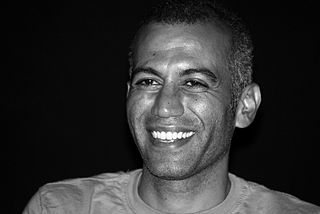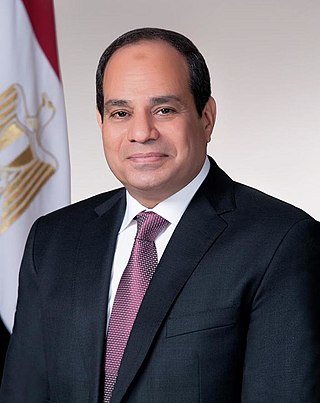Related Research Articles
The Muslim Brotherhood is an Islamic organization that was founded in Ismailia, Egypt by Hassan al-Banna in March 1928 as an Islamist religious, political, and social movement. The group spread to other Muslim countries but has its largest, or one of its largest, organizations in Egypt, where for many years it has been the largest, best-organized, and most disciplined political opposition force, despite a succession of government crackdowns in 1948, 1954, 1965 after plots, or alleged plots, of assassination and overthrow were uncovered. Following the 2011 Revolution the group was legalized, and in April 2011 it launched a civic political party called the Freedom and Justice Party (Egypt) to contest elections, including the 2012 presidential election when its candidate Mohamed Morsi became Egypt's first democratically elected president. One year later, however, following massive demonstrations, Morsi was overthrown by the military and arrested. As of 2014, the organization has been declared a terrorist group by Russia, Egypt, UAE, Saudi Arabia and is once again suffering a severe crackdown.

The General Intelligence Service, often referred to as the Mukhabarat is an Egyptian intelligence agency responsible for providing national security intelligence, both domestically and internationally. The GIS is part of the Egyptian intelligence community, together with the Office of Military Intelligence Services and Reconnaissance and National Security Agency.

Presidential elections were held in Egypt in 2012, with the first round on 23 and 24 May 2012 and the second on 16 and 17 June, the first democratic presidential election in Egyptian history. The Muslim Brotherhood declared early 18 June 2012, that its candidate, Mohamed Morsi, won Egypt's presidential election, which would be the first victory of an Islamist as head of state in the Arab world. It was the second presidential election in Egypt's history with more than one candidate, following the 2005 election, and the first presidential election after the 2011 Egyptian revolution which ousted president Hosni Mubarak, during the Arab Spring. However, Morsi's presidency was brief and short-lived, and he later faced massive protests for and against his rule, only to be ousted in a military coup in July that year.

The 2011 Egyptian revolution, also known as the 25 January Revolution, began on 25 January 2011 and spread across Egypt. The date was set by various youth groups to coincide with the annual Egyptian "Police holiday" as a statement against increasing police brutality during the last few years of Hosni Mubarak's presidency. It consisted of demonstrations, marches, occupations of plazas, non-violent civil resistance, acts of civil disobedience and strikes. Millions of protesters from a range of socio-economic and religious backgrounds demanded the overthrow of Egyptian President Hosni Mubarak. Violent clashes between security forces and protesters resulted in at least 846 people killed and over 6,000 injured. Protesters retaliated by burning over 90 police stations across the country.

The Supreme Council of the Armed Forces is a statutory body of between 20 and 25 senior officers of the Egyptian Armed Forces, and is headed by Field Marshal Abdul Fatah al-Sisi and Lieutenant General Mohamed Ahmed Zaki. The council is convened only in cases of war or great internal emergencies. As a consequence of the Egyptian Revolution of 2011, SCAF assumed power to govern Egypt from departing President Hosni Mubarak on 11 February 2011, and relinquished power on 30 June 2012 upon the start of Mohamed Morsi's term as president. The Council has met regularly in times of national emergencies. During the course of the 2011 revolution, the Supreme Council of the Armed Forces met first on 9 February 2011 under the chairmanship of Egyptian president, Hosni Mubarak. The Council met for the first time without the chairmanship of the president on the following day, 10 February, and issued their first press statement which signaled that the council was about to assume power which they did the following day after Mubarak's resignation. The military junta was headed by Field Marshal Mohamed Hussein Tantawi who served as the Minister of Defense under Mubarak, and included the service heads and other senior commanders of the Egyptian Armed Forces, namely Lt. Gen. Sami Hafez Anan, Armed Forces Chief of Staff; Air Marshal Reda Mahmoud Hafez Mohamed, Air Force commander; Lt. Gen. Abd El Aziz Seif-Eldeen, Commander of Air Defense; and Vice Admiral Mohab Mamish, Navy Commander in Chief.

The Egyptian Crisis was a period that started with the Egyptian revolution of 2011 and ended with the installation of a counterrevolutionary regime under the presidency of Abdel Fattah el-Sisi in 2014. It was a tumultuous three years of political and social unrest, characterized by mass protests, a series of popular elections, deadly clashes, and military reinforcement. The events have had a lasting effect on the country's current course, its political system and its society.

The following is a chronological summary of the major events that occurred during the Egyptian Revolution of 2011, after Hosni Mubarak's resignation. Protests and riots led to the deaths of hundreds, injuries of thousands and the arrests of tens of thousands. Millions have mobilised the streets since the revolution.

Essam Abdel-Aziz Sharaf is an Egyptian academic who was the Prime Minister of Egypt from 3 March 2011 to 7 December 2011. He served as Minister of Transportation from 2004 to 2005.

Hossam el-Hamalawy is an Egyptian journalist, blogger, photographer and socialist activist. He is a member of the Revolutionary Socialists and the Center for Socialist Studies.

Human rights in the post-Mubarak transition have been the subject of concern and controversy since the 2011 Egyptian revolution. The Supreme Council of the Armed Forces (SCAF) Arabic: المجلس الأعلى للقوات المسلحة, al-Maǧlis al-ʾAʿlā lil-Quwwāt al-Musallaḥah in particular have been the focus of concerns about human rights violations. The SCAF, which consists of a body of 20 senior officers in the Egyptian military, was handed the power to govern Egypt after the ouster of President Hosni Mubarak on 11 February 2011 as a consequence of the revolution.

Mona Seif is an Egyptian human rights activist known for her participation in dissident movements during and after the 2011 Egyptian revolution, for her creative use of social media in campaigns, and for her work to end military trials for civilian protesters. She is a biology graduate student, investigating the BRCA1 breast cancer gene.
On 1 February 2012, a massive riot occurred at Port Said Stadium in Port Said, Egypt, following an Egyptian Premier League football match between Masry and Ahly. Seventy-four people were killed and more than 500 were injured after thousands of Al Masry fans stormed the stadium stands and the pitch following a 3–1 victory by their club and violently attacked Ahly fans using clubs, stones, machetes, knives, bottles, and fireworks, trapping them inside the El Ahly partition of the stadium. Many of the deaths were due to police refusal to open the stadium gates, trapping the Ahly fans inside, leaving some to die, and killing others in a stampede while trying to escape. Civil unrest and severe clashes continued until 11 February, but general strikes ended on 13 February. Riots erupted in Cairo, Alexandria, and Suez. Police fired tear gas at protesters; thus, clashes erupted on the streets due to tear gas battles. Unrest calmed and ended on 13 February.

Khaled Ali is an Egyptian lawyer and activist. He is known for his advocacy for reform of government and private sector corruption and for promoting social justice and labor rights. He is the former head of the Egyptian Center for Economic and Social Rights (ECESR), and co-founder of the Front for Defending Egyptian Protesters and the Hisham Mubarak Law Center (HMLC).
Following the 2011 Egyptian revolution, the Muslim Brotherhood in Egypt became one of the main forces contending for political power in Egypt against the Supreme Council of the Armed Forces (SCAF) and other established centers of the former Hosni Mubarak regime.

Abdel Fattah Saeed Hussein Khalil el-Sisi is an Egyptian politician and retired military officer who has served as the sixth and current president of Egypt since 2014. Before retiring as a general in the Egyptian military in 2014, Sisi served as Egypt's deputy prime minister from 2013 to 2014, as its minister of defense from 2012 to 2013, and as its director of military intelligence from 2010 to 2012. He was promoted to the rank of Field Marshal in January 2014.

The following is a chronological summary of the major events that occurred after the Egyptian Revolution of 2011, after Mohamed Morsi's election as the fifth President of Egypt, on 30 June 2012. This article documents the third wave of the Egyptian Crisis.

The 2012–2013 Egyptian protests were part of the crisis in Egypt including the June 2013 protests, the July 2013 coup d'état, and part of the post-coup unrest. They saw varying opposition against three contiguous heads of state; namely, the Supreme Council of the Armed Forces (SCAF), Muslim Brotherhood, and the de facto ruling Egyptian Armed Forces.

Protests against the 2013 Egyptian coup d'état erupted in July 2013. Immediately following the removal of President Mohamed Morsi by the Egyptian Armed Forces on 3 July 2013 amid demonstrations against Morsi's rule, many protesters amassed near the Rabia Al-Adawiya Mosque to call for Morsi's return to power and condemn the military, while others demonstrated in support of the military and interim government. Deadly clashes such as Rabaa massacre continued for several days, with three particularly bloody incidents being described by officials as "massacres" perpetrated by security forces. During the month of Ramadan, prime minister Hazem al-Beblawy threatened to disperse the ongoing Pro-Morsi sit-ins in Rabaa al-Adaweya square and al-Nahda square. The government crackdown of these protests occurred in a violent dispersal on 14 August 2013. In mid-August, the violence directed by the army towards the protesters escalated, with hundreds killed, and the government declaring a month-long nighttime curfew.
On 29 January 2015, militants from the ISIL-affiliated Wilayat Sinai militant group launched a series of attacks on army and police bases in Arish using car bombs and mortars. The attacks, which occurred in more than six different locations, resulted in 44 deaths.

The Girl in the Blue Bra is the name given to an image of an Egyptian woman who participated in the Tahrir Square protests in opposition to Egypt's Supreme Council of the Armed Forces (SCAF), the military coup that ousted Hosni Mubarak during the 2011 Egyptian Revolution in opposition to Mubarak's presidency.
References
- 1 2 Sherif Tarek, SCAF: Intelligence points to plan to burn Parliament building, Ahram Online , 19 December 2011
- ↑ Hassan, Abdalla F. (2015). Media, Revolution and Politics in Egypt: The Story of an Uprising. London: I.B. Tauris. p. 124. ISBN 978-1-78453-217-8.
- ↑ Egypt clashes move into 4th day, U.S. worried Archived April 26, 2012, at the Wayback Machine , Reuters , 19 December 2011
- ↑ "Egypt: Prosecute Sexual Assaults on Protesters". Human Rights Watch. 2011-12-22. Retrieved 2021-04-27.
- 1 2 Bradley, Matt (2011-10-13). "Egyptian Generals Defend Actions". Wall Street Journal. ISSN 0099-9660 . Retrieved 2021-04-27.